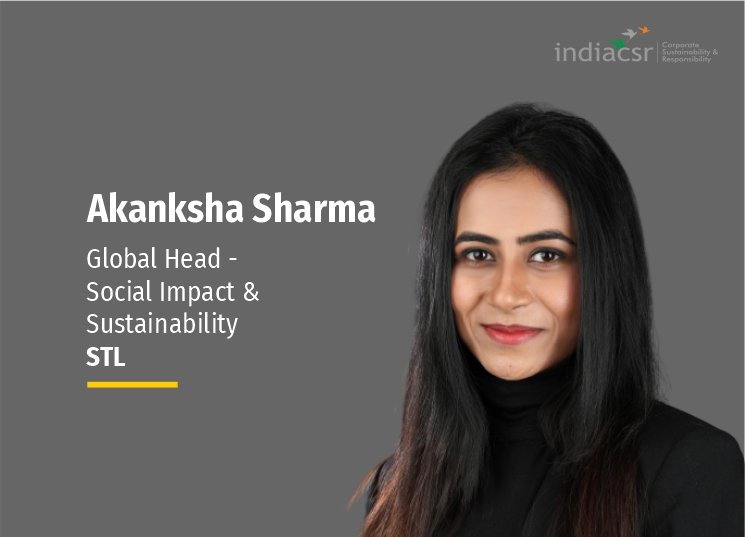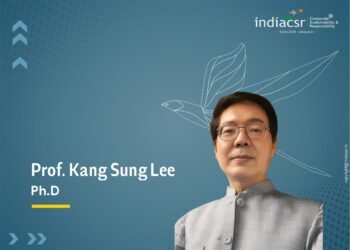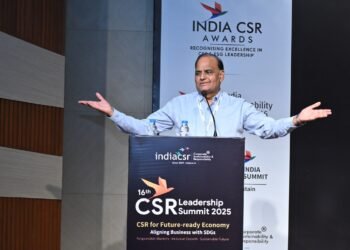STL’s five CSR emphasis areas are Women’s empowerment, education, healthcare, environmental and volunteering because of their inherent links to and enablement of other development goals. Akanksha Sharma, Head CSR and Sustainability, STL, spoke on STL’s sustainable development and sustainability initiatives with India CSR.
What are the three to five key causes that your company supports?
We have aligned our CSR focus areas with the United Nations’ Sustainable Development Goals (SDGs) and the national agenda for development. Our initiatives are centred around four focus areas – Women Empowerment, Quality Education, Accessible Healthcare, and Environment Preservation.
To deliver on such ambitious targets, we believe that it is not enough to treat the issues on their veneer but develop deep-rooted engagements capable of addressing the root cause of the persisting issues through a multi-stakeholder approach.
Women empowerment
Intending to reduce the gender gap, we have established a holistic program focusing on the overall development of women of all ages. Through a comprehensive approach that incorporates personality development, vocational training, mobilization through self-help groups, and livelihood opportunities, the Jeewan Jyoti Women Empowerment program has impacted over 18,000 lives across 100 villages in Bhor, Velhe, and Haveli talukas in Pune. Today, these women are capable of assuming responsibility for the change that they would like to see in their communities and drive it together with the Jeewan Jyoti programme.
Education
Through our ed-tech and digital empowerment initiatives like Virtual Classrooms, Pragyan, and the Digital Empowerment buses we have leveraged technology to bridge some significant gaps in terms of quality education and digital literacy reaching the masses at the bottom of the pyramid as well as building faculty capabilities. This has helped over 810,000 students understand concepts and languages better, spurring in them an urge for higher learning and self-confidence among other aspects.
Healthcare
Through our healthcare interventions such as the Mobile Medical Unit, we have been providing quality healthcare to tribal communities that do not have access to even basic health facilities. STL’s CSR projects in health have been the longest-running initiatives, and they have provided relief and respite to more than 435,000 people residing in some of the country’s remotest corners.
Environment
With our programmes like the Green Belt, Gram Samrudhi, and Jaldoot, we have been able to conserve over 785,000 cubic meters of water and maintain more than 19,000 plantations while improving the livelihoods of the locals by encouraging improvisation and optimum usage of water. On the other hand, afforestation is helping in providing a cleaner environment by gradually offsetting the ill effects of the extensive industrialisation in the region.
Volunteering
Our employees are our transformation enablers. They have helped benefit over 9500 lives by volunteering more than 7000 hours through several one-offs and annual volunteering programmes.
What is the output, outcome, and impact of your company’s flagship CSR projects?
Each of our CSR programs is designed in a way where the issue at hand is dealt with through an all-inclusive approach. That way, the intervention delves deep to address the main reasons behind why the issue prevails. It has helped us impact over 1.32 million lives till FY 19-20.
Our Women Empowerment program – Jeewan Jyoti, for instance, aims at empowering rural women with livelihood opportunities. However, it’s not simply centred around ensuring they get employed or about vocational training. It is about helping them evolve into self-sufficient and confident individuals and promoting equitable communities where they are treated with respect and dignity.
What evolved out of this was the fact that women started understanding that they need to initiate the change they would like to see in their communities and work with us to facilitate that. Not only did we see a significant increase in admissions over the years, but also education for the girl child improving.
Today, we have empowered over 3500 women from across 100 villages in Velhe, Bhor, and Haveli districts. The marriageable age for women has even increased in the region from 16-18 to over 20 now as these women want to work and be financially independent before getting married. Through SHGs, women in these villages, which once were patriarchal now lead development through entire ecosystems they have created through micro-enterprises. No longer are women looked at upon as simply home-makers. They are looked up to and considered significant contributors in their families, fully aware of their capabilities, and even supported by their husbands and families.
Our healthcare program – the Mobile Medical Unit (MMU), run in Silvassa, ensures quality healthcare is accessible to tribal who are majorly daily-wage earners residing in some of the region’s remotest villages. These locations do not even have basic healthcare facilities within a radius of 10 kilometres. It has also been instrumental in reducing healthcare costs for these tribal through weekly visits that ensure the elderly and children are cared for through the provision of free medicines. To date, over 238,000 tribals have been treated and now understand the importance of hygiene and sanitation, proactively identify symptoms of contagious ailments that help prevent outbreaks and take necessary precautions to avert season-related illnesses.
How can the country handle these, and is it handling these issues.
The COVID-19 pandemic is a grim reminder that climate change and linked environmental risks like unstable weather patterns and the changing nature of pathogens can no longer be overlooked. Such threats, together with other anomalies like growing emissions and ever-escalating levels of plastic waste are going to be formidable challenges to human-kind. The phase is appropriate for implementing a major shift from the present linear model of myopic exploitation of limited resources to a climate-neutral circular economy that seeks to augment the use of natural resources and diminish our ecological footprint through the interlocking of industrial interests.
However, an attempt to build back better in the post-COVID-19 world will implicate a central reset in our industrial progressions, financial systems, our approach to nature, and our socio-economic and cultural associations. As we emerge from COVID-19, our missions to drive business income and universal growth need to be dictated by the doctrines of the triple bottom line and the goals in the UN sustainable development agenda, with the planet, people, and profit at its core.
I believe that the approaches for attaining financial interdependence and circularity will be based on concentrated community action, collaboration, ecological awareness, indoctrinating keen institutional consciousness towards sustainability, innovation, and an unyielding mechanism to incessantly improve on ambiguities across the value chain to live up to the principles of sustainable business practices.
In this national effort, what is business doing and how can it do it better?
Firstly, sustainability needs to be looked at from an all-inclusive perspective, one that encompasses the environmental, social, governance, and economic parameters. It is about creating shared value for every stakeholder and not simply about green manufacturing.
Considering the magnitude of the world’s social, environmental, and governance issues, no one corporate or institution can facilitate the transformation needed to bring about a meaningful change. We believe sustainability and business profitability are synonymous with each other, and we need to ensure that our business partners are equally invested in creating a sustainable future. Collaboration is key to driving the sustainability agenda as it cannot be just about your operations. It has to be actioned across the entire ecosystem.
On the ecological front, system-wide approaches through technology and social investments that will reduce one’s environmental footprint with measured economic returns, in the long run, need to be implemented. Here the government’s help on prioritizing renewable energy along with tax reforms will help tremendously to promote green energy.
From a sustainable development viewpoint, collective action through a holistic strategy that is deeply rooted in an organization’s culture and values is crucial. Opportunities across the value chain need to be proactively identified. Innovation and leadership involvement is pivotal to achieving this, and it’s the need of the hour with climate change and water scarcity being not just local or national issues, but global.
Any good examples of the above.
There are several examples of sustainable development, including green space, crop rotation, sustainable design and construction, water-efficient fixtures, renewable clean energy, waste to energy recycling, water treatment, etc. Implementing one or several of these concepts is fast becoming a central part of many businesses’ future plans.
We believe that every business interaction should be guided by moral and ethical practices. Therefore, for us, Sustainability is not only about the environment, but also about social, governance, and economic factors whereby we endeavour to ensure that our stakeholders and communities progress along with us. Our operations are thus, eco-friendly, responsible, aligned with the UN’s Sustainable Development Goals and we are also deeply committed to the areas of human rights, anti-corruption, labour rights.
Under Sustainability, Zero Waste to Landfill is one of the fundamental ways we drive responsible operations. We even became the world’s first integrated optic fibre and cable manufacturer to become ‘Zero Waste to Landfill‘ certified for our operations in India. To date, we have diverted over 64,000 MT of waste away from landfills. However, energy conservation, reduction of carbon emission, water positivity, sustainable sourcing, and life cycle assessments are some of the other areas we are committed to. We believe that each of these is equally important and needs to be driven in tandem to address one of the most pertinent issues of our time; ‘climate change’.
Lastly and most importantly, we focus on strict adherence to the 10 principles of the UN Global Compact Network around Human Rights, Labour Practises, Fair Wages, and Anti-Corruption. Each of these forms an indispensable part of our Code of Conduct, which is part of every partner contract and something even our employees need to conform to.
Your expertise on the ground, what you have seen and done well, and that which can be held as a beacon to other corporations?
Sustainability and business success are synonymous with each other. We at STL are unswerving in our effort to ensure that our business partners are equally invested in fashioning a sustainable future.
We work with several stakeholders to create innovative and durable products and packaging as well as identify better reusing and recycling options with the help of their expertise. However, all of these form part of a larger agenda that is our Zero Waste to Landfill initiative. Through this program, we have repurposed over 170 MT of by-products by collaborating with other industries on exploring diverse ways these materials can be reused in their processes. ZWL is a potent tool to address climate change as well as mitigate India’s major issue of waste management. An open-minded attitude to waste management needs to be entwined into an organization’s cultural fabric and its highly cohesive value chain. Its attainment is closely connected with a corporate’s eco-conducive bearing in other areas like water management, energy conservation, sustainable sourcing, and Life Cycle Assessments (LCA) among others.
With 5G coming in, we are going to witness an extraordinary density in the deployment and usage of fibre-optic assets. ZWL as a tactical policy construct and a critical operative discipline, thus need to be incorporated. In a world already on the threshold of irreparable climatic changes, economic circularity and recycle and reuse-centric material control can be the means we have been looking for to attain the balance between material progress and community interests, ending the growth vs. development argument.
I firmly believe collaboration is key to driving the sustainability agenda as it cannot be just about your operations. It has to be actioned across the entire ecosystem together with partners from that network, creating an ongoing ripple of change.
From a sustainability standpoint, collective action through an all-inclusive strategy that is deeply ingrained in an organization’s ethos and beliefs is fundamental. Waste management or any other facet – be it energy consumption reduction or water positivity, carbon neutrality… none of them can be addressed through a reactive approach or by operating in silos. We need to proactively detect prospects across the value chain to decrease, reprocess, reclaim, and replenish. Innovation is core to accomplishing this, and it’s the need of the hour with climate change and water scarcity being not just local or national issues, but global.
Also, what is their CSR budget?
While our CSR budgets are as per the law, which is 2% of the average of the last 3 years profits, our sustainability spends has always been part of our business expenditure.
(CopyRight@IndiaCSR)






















